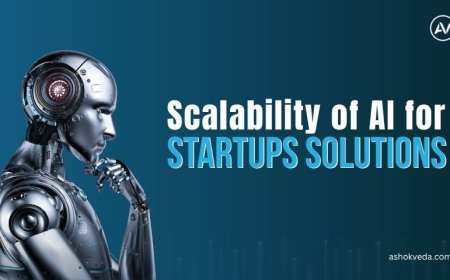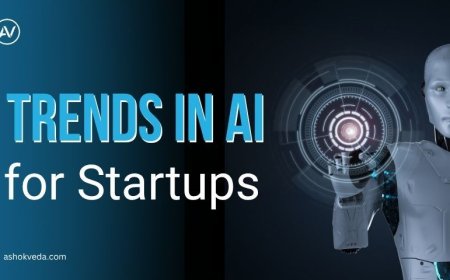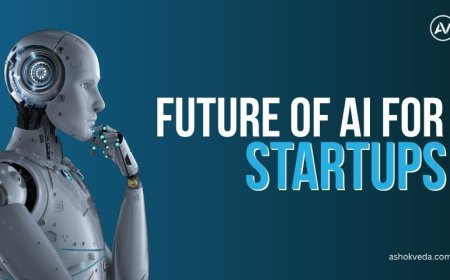Cost of AI for Startups Implementation: A Complete Guide
Explore the real cost of AI for startups, key challenges, ROI insights, and smart strategies to make AI adoption affordable and impactful.
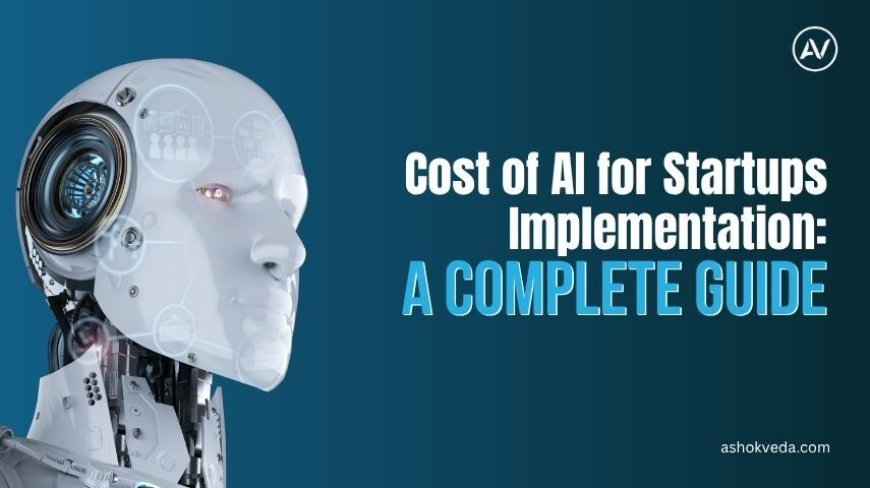
Artificial Intelligence (AI) has become the driving force behind innovation and scalability. From automating workflows to enhancing customer experiences, AI for startups is no longer optional; it’s a strategic necessity. However, one of the biggest challenges new founders face is understanding the true cost of AI implementation and how to balance investment with impact. This guide breaks down every element, from development and infrastructure to maintenance and ROI, helping startups make informed, cost-effective decisions while staying competitive in a constantly changing world.
Understanding Why AI for Startups Matters
Before discussing costs, it’s essential to understand why so many new businesses are turning to AI.
AI helps startups:
-
Automate repetitive processes
-
Analyze vast data sets for smarter decisions
-
Personalize user experiences
-
Optimize marketing and sales efforts
-
Scale faster with fewer human errors
In short, AI for startups isn’t a luxury; it’s a growth accelerator. Yet, integrating AI without understanding its costs and ROI can lead to financial strain, missed opportunities, or inefficient systems.
The Core Cost Components of AI Implementation
When estimating the cost of AI for startups, you need to consider multiple layers, from data to deployment.
Here’s a detailed breakdown:
1. Data Collection and Preparation
AI systems learn from data. But before they do, that data must be gathered, cleaned, and structured.
-
Data collection: Depending on your niche, sourcing quality data can range from $5,000 to $50,000.
-
Data labeling and preprocessing: Manual labeling or using AI-based labeling tools adds $10,000–$30,000 more.
For data-heavy startups (like fintech or healthcare), this stage alone can consume up to 40% of the total AI budget.
2. Model Development
Building an AI model is like teaching a brain to perform a specific task, whether predicting trends or recognizing images.
-
Custom AI model: $30,000–$150,000
-
Pre-trained model (like OpenAI or Google APIs): $1,000–$10,000/month based on usage
Startups that use pre-trained models can significantly reduce initial costs while still achieving solid results.
3. Infrastructure and Tools
You’ll need servers, cloud storage, and computing power to run your models.
-
Cloud AI platforms (AWS, Azure, Google Cloud): $500–$5,000/month
-
On-premise setup: $50,000+ upfront
Most startups prefer cloud-based AI because it offers scalability and pay-as-you-go flexibility.
4. Talent and Expertise
AI talent is in high demand and often the costliest element.
-
AI engineer or data scientist: $100,000–$200,000/year
-
Freelancers or agencies: $50–$150/hour
Many early-stage founders minimize this cost by hiring part-time experts or outsourcing to specialized firms.
5. Maintenance and Upgrades
AI systems aren’t “set it and forget it.” They need constant monitoring, retraining, and optimization.
-
Annual maintenance: 15–20% of total development cost
-
Model retraining: Every 6–12 months, depending on data drift
Factoring this into your financial plan ensures long-term sustainability.
The Hidden Costs Most Startups Overlook
Even after budgeting for visible expenses, several hidden factors can inflate the total AI cost for startups.
1. Data Privacy and Compliance
If your startup handles user data, compliance with laws like GDPR or India’s DPDP Act can involve audits and legal support, costing $5,000–$25,000.
2. Integration with Existing Systems
Linking your AI solution with current software (CRM, ERP, etc.) may require custom APIs or middleware.
3. Downtime and Iteration
Initial AI deployments often need fine-tuning. Delays and testing can affect productivity and revenue in the short term.
4. Training Employees
Even the best AI tool is ineffective if your team doesn’t know how to use it. Budget for internal training and onboarding.
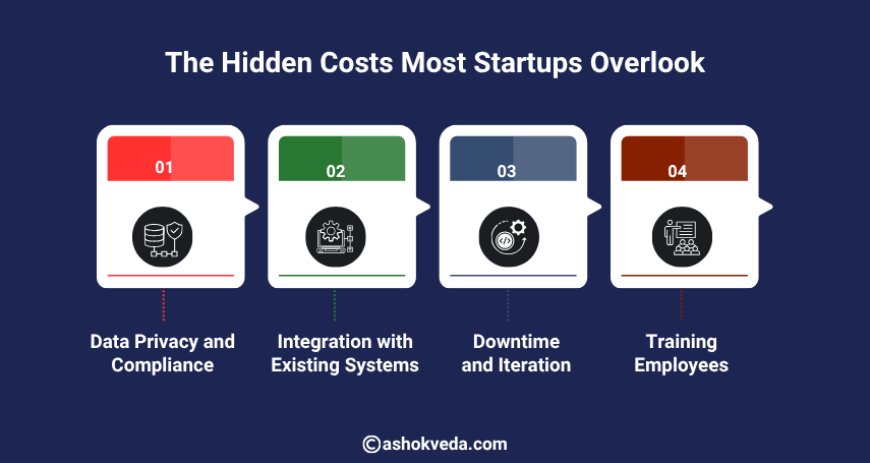
Factors That Influence AI Implementation Cost
Not every startup will spend the same. The final price depends on factors like
-
Project complexity: Simple automation vs. advanced predictive analytics
-
Industry type: Fintech, healthcare, or logistics AI often needs higher accuracy (and costlier models)
-
Data volume and quality: More data means higher storage and processing costs
-
Deployment speed: Fast-track AI projects require more manpower and cost
Startups that plan strategically can control costs without compromising quality.
How to Make AI for Startups Affordable
If you’re worried about costs, here’s good news: adopting AI for startups doesn’t always require massive budgets. Strategic approaches can make it accessible and scalable.
1. Start Small, Scale Fast
Begin with a Minimum Viable AI (MVA), a small, testable version of your idea.
Once proven effective, expand gradually.
2. Use No-Code or Low-Code AI Tools
Platforms like Google AutoML, Microsoft Copilot Studio, and ChatGPT APIs let non-technical teams integrate AI without coding expertise.
3. Partner with AI-as-a-Service Providers
Instead of building from scratch, subscribe to AI-as-a-Service platforms that handle hosting, model training, and maintenance for you.
4. Outsource Smartly
Hiring freelancers or partnering with specialized AI development firms can reduce costs by up to 60% compared to full-time teams.
5. Leverage Open-Source AI Models
Tools like TensorFlow, Hugging Face, and PyTorch are free to use and highly customizable, perfect for tech startups with developer talent.
ROI: The Real Value Behind AI for Startups
While the initial investment might seem high, the long-term benefits often outweigh the costs.
Here’s what startups gain from AI adoption:
-
Faster decision-making: Data-driven insights enhance accuracy.
-
Cost reduction: Automation cuts repetitive workload.
-
Personalized customer experience: Improves retention and lifetime value.
-
Scalable growth: AI allows startups to expand without linear cost increases.
Example: A SaaS startup that invests $40,000 in AI automation can save $80,000 annually in manual labor, doubling efficiency in under a year.
What Happens If You Delay AI Adoption
Waiting too long to adopt AI can mean falling behind competitors who already benefit from it.
-
Competitors gain faster insights through predictive analytics
-
Manual teams can’t match AI’s productivity
-
Customers expect personalization, and AI delivers it automatically
-
Investors favor tech-enabled startups for scalability
In essence, AI for startups isn’t just about innovation; it’s about survival in a data-driven economy.
Building Trust: Choosing the Right AI Partner
Selecting the right partner is as important as the technology itself.
Look for partners who:
-
Have proven experience in your industry
-
Offer transparent pricing and scalable models
-
Provide post-deployment support
-
Follow ethical AI practices and data security standards
A reliable partner not only builds your system but also ensures it evolves with your business.
The cost of AI for startup implementation might seem daunting, but when done strategically, it’s one of the smartest investments you can make. AI can transform operations, boost efficiency, and give your business a competitive edge. The key is starting small, scaling wisely, and partnering strategically. With proper planning, AI for startups becomes not an expense but an enabler of exponential growth. In the next few years, startups leveraging AI early will dominate their industries, while others play catch-up. The choice, as always, is in the founder’s hands.

























